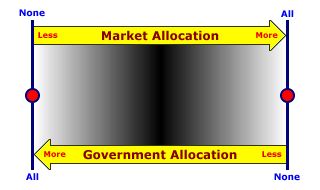
|
|
ACCELERATOR: The ratio between investment expenditures and the change in gross domestic product. This is based on the notion that business investment depends on the rate of growth of aggregate output. If the economy is expanding, in other words, then the business sector invests in more capital goods to produce the extra output needed. This accelerator effect modifies and magnifies the simply multiplier effect based on the induced consumption and the marginal propensity to consume.
Visit the GLOSS*arama
|
|


|

|
                           PURE MARKET ECONOMY: An economy, or economic system, that relies exclusively on markets to allocate resources and to answer all three questions of allocation. This theoretical ideal has no governments, markets are used to make all allocation decisions. Then contrasting theoretical ideal is a pure command economy in which governments make all allocation decisions. | Economic Systems |  |
A pure market economy is a theoretical extreme on the spectrum of economic systems that does not actually exist in the real world. It does, however, provide a benchmark that can be used for comparison with real world economic systems. In pure market economies, markets are used by buyers and sellers to voluntarily exchange goods, services, and resources. Buyers seek to pay the lowest prices. Sellers seek to receive the highest prices. Resources are allocated to the production of the goods with the highest prices and greatest satisfaction of wants and needs. The real world embodiment of a pure market economy is termed a market-oriented economy or capitalism. The market-oriented economy of the United States is the primary example. While, in theory, resource allocation could be undertaken exclusively through markets or governments, in the real world, all economies rely on a mix of both markets and governments for allocation decisions, what is termed a mixed economy.

Recommended Citation:PURE MARKET ECONOMY, AmosWEB Encyclonomic WEB*pedia, http://www.AmosWEB.com, AmosWEB LLC, 2000-2025. [Accessed: July 18, 2025].
Check Out These Related Terms... | | | | | | | |
Or For A Little Background... | | | | | | |
And For Further Study... | | | | | | |
Search Again?
Back to the WEB*pedia
|



|

|
|
Cyrus McCormick not only invented the reaper for harvesting grain, he also invented the installment payment for selling his reaper.
|

|
|
"A winner is someone who recognizes his God-given talents, works his tail off to develop them into skills, and uses those skills to accomplish his goals. " -- Larry Bird, basketball player
|

|
DCF
Discounted Cash Flow
|

|
|
Tell us what you think about AmosWEB. Like what you see? Have suggestions for improvements? Let us know. Click the User Feedback link.
User Feedback
|


|


